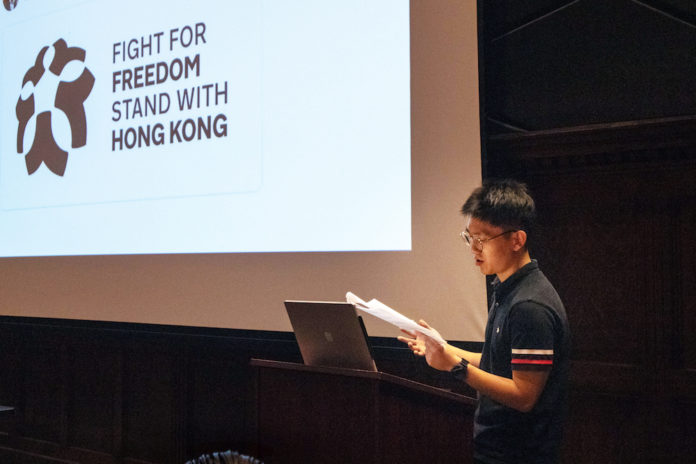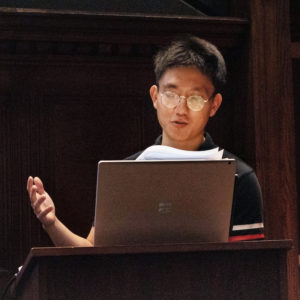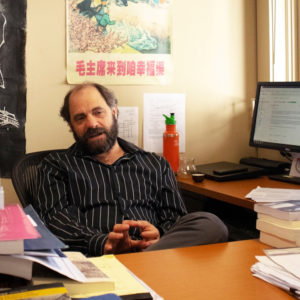
Hiayi Zhao (senior), a student from mainland China, spoke about the relationship between the NBA and U.S.-China international relations during a talk in Choi Auditorium Tuesday, Nov. 8. Zhao outlined the recent controversy surrounding the NBA and China after Houston Rockets general manager Daryl Morey tweeted his support for protesters in Hong Kong.
In reaction to the tweet, which read “Fight for freedom, stand with Hong Kong,” Chinese Central Television and China-based company Tencent — responsible for $1.5 billion of the NBA’s revenue — suspended the broadcast of NBA games in China. Rockets owner Tilman Fertitta distanced the team from Morey’s stance, and Morey quickly deleted the tweet and apologized to Chinese fans. In a post-practice press conference Oct. 7, Rockets player James Harden said, “We apologize. We love China.” According to the New York Times, the Chinese government asked NBA commissioner Adam Silver to fire Morey. In a statement, Silver said China was important to the NBA, but the organization would not rescind Morey’s comment.
“It is inevitable that people around the world — including from America and China — will have different viewpoints over different issues, ” Silver said in an official NBA statement. “However, the NBA will not put itself in a position of regulating what players, employees and team owners say or will not say on these issues.”

At the beginning of the talk, Zhao said some of his statements might be controversial, as he was trying to present a side of the issue that many Americans might be unaccustomed to. In an interview, Zhao said the main point of his talk was to communicate the fact that people cannot change the fundamental cultural beliefs of a person living in another country.
According to Zhao, the NBA controversy emerged because of a misunderstanding of the social and cultural differences between the U.S. and China. Zhao said he wanted the audience to remember he also had cultural biases as a Chinese-American student. According to Zhao, many mainland Chinese citizens believe the NBA should face the consequences of their words when they do business in foreign countries.
“They are doing what they think is right, but that right is subjective. The definition of right is dictated by U.S. norms, U.S. culture and beliefs, which is distinct from another culture,” Zhao said. “If you want to do business in another cultural setting, you might expect to receive criticism if you don’t respect that culture.”

Alexander Day, professor of history and East Asian studies, said the U.S. and China operate under different sets of universal ideas, and those differences account for the current NBA controversy. Day said a tweet that could intend to show support for individual rights to the average American could mean something completely different to a Chinese citizen, partly because of misconceptions perpetuated by the Chinese government.
“They [citizens of mainland China] hear that as a tweet about breaking up China, they hear that as a tweet about independence for Hong Kong because they’ve been told by the government that that’s what the protests are about,” Day said. “That creates a lot of misunderstanding because they don’t understand the protests and the meaning of the protests in the same way.”
Zhao said a common misconception among Americans is that Chinese citizens are oppressed and have no political agency. Cheer Huang (first year), an international student from mainland China, said many Americans do not realize that access to information among the younger generation in China is changing because many young people in China today choose to study abroad in places like the U.S. and Canada. Huang said she did not agree with all the viewpoints Zhao presented in the talk. Huang, who is from the Chinese mainland, said she thinks people protesting in Hong Kong are being mistreated and the Chinese government is violating the protesters’ rights.
“There is police brutality happening in the Hong Kong social movement,” Huang said. “It definitely violates their [the people of Hong Kong’s] rights. You can’t just control the protests by using pepper spray.”
Zhao said by hosting the talk, he was trying to open up a conversation between the two countries because he saw it as his duty as an international student to help bridge the cultural misunderstandings between the U.S. and China. According to Zhao, sports could be used as a medium and a tool to improve international relations between countries, as sports and politics are inherently intertwined.
“The great qualities of the NBA can be inspiring all around the world— not just in China, but in other places — and that’s basically the power of sports,” Zhao said. “Political ideologies and ideas could be translated because sports as a medium can have a lot of impacts, and people can view it positively, and it can actually make positive social change.”
![]()






























